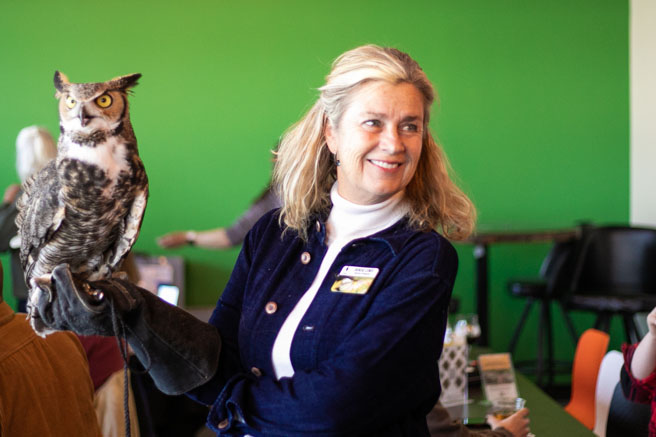Denise Lewis, the resident raptor expert at Fontenelle Forest, will offer a look into the world of birds of prey at the next Science Café, to be held in person at 7 p.m. on June 6 at the Slowdown, 729 N. 14th St. in Omaha.
A great horned owl and peregrine falcon will join Lewis, who will discuss the behavioral aspects of each.
Lewis has worked with birds of prey for 25 years and has shared her passion for these incredible species for 11 years at Fontenelle Forest through educational raptor outreach programs. She also oversees the Raptor Woodland Refuge, located next to the Fontenelle Forest Nature Center.
“Most folks will never see a bird of prey up close, and they’re quite beautiful,” Lewis said. “Both educational outreach programs and the Raptor Woodland Refuge provide people a chance to see raptors up close and learn about them.”
Fontenelle Forest’s Raptor Woodland Refuge is a unique, canopy-level exhibit 30 feet above the forest floor. Designed according to the natural habitat of the rescued birds housed within it, Raptor Woodland Refuge is home to more than two dozen birds of prey, including bald eagles, turkey vultures, a Swainson’s hawk, ferruginous hawk, gyrfalcon, peregrine falcon, eastern screech owl and more.
All of the raptors who live at the forest are non-releasable due to a variety of factors, many involving previous injuries. These birds would not survive on their own and cannot be released.
“Speaking with the public about raptors gives people a chance to understand why these birds do (and eat) what they do,” Lewis said. “We’re seeing declining numbers for several raptor species in Nebraska, and education programs allow us to share what we can do to protect birds of prey. Children’s raptor education is especially important, as they are the next generation tasked with protecting them.”
To learn more about the birds of prey that call Fontenelle Forest home and how you can support efforts in raptor conservation and education, click here.
Science Cafés involve a conversation with an expert about current science topics and are open to everyone. Each meeting is organized around an interesting topic of conversation. Experts give a brief presentation followed by a Q&A period.
